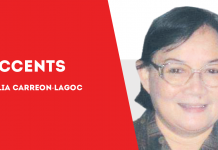
YESTERDAY, we looked up the family album that has gathered dust in the cabinet, and there is the photo of the handsome young man, Edmundo Rivera Legislador, and the dates that show a short life span: November 24, 1950 – July 27, 1973. Today then, July 27 as I write this, is his death anniversary.
Below the picture, the caption I wrote in red is still very clear: Toto Eddie: our conscience and inspiration. Nothing could be more apt because when we get to be overwhelmed by our “burgis” (bourgeois) concerns, our memory of him and all the things he stood for prick the conscience.
Who was Edmundo Rivera Legislador or Toto Eddie as we endearingly called him? He was my first cousin, the hero who stood out among the many of us in the clan, son of my aunt Piedad Rivera-Legislador and nephew to my mother Cristeta Rivera-Carreon.
Less than a year after Martial Law was declared, the military’s bullet made dead aim of Toto Eddie in the hills of Antique. It was there among “the least, the lost, and the last” of our countrymen where he sought to continue the struggle against the dictatorship.
He was one of the five who were killed in a clash with the military in the hinterlands of Antique in 1973: Ferdie Arceo, Vic Beloria, Albert Espinas, and Virgil Ortigas, student leaders all in their twenties. One would be hard put to find a finer breed of intelligent, idealistic young men who fought the Marcos dictatorship and gave up their lives in the struggle for national democracy.
I remember jotting down portions from Ferdie Arceo’s letter which his father, Atty. Regie Arceo, read during a memorial held in 1998. Written at the foothills of the Madia-as ranges, the letter spoke for the five of them: “Our civil liberties are not suppressed here… Life is not meant to be lived comfortably… Life is a continuing struggle against oppression, injustice and ignorance… I am amongst the people whose cause I have embraced…”
Snippets of my cousin’s life come to mind. As a young boy, he had been bothered by the hand-to-mouth existence of the laborers at his parents’ rice mill, and he took care that the cargadors and the machine operators got a fair deal.
In the Kalinangan alternative plays that dramatized the ills of a sick society, Toto Eddie moved the audience with his innate gifts as actor and singer. Adept at the guitar, he would teach us cousins this song: “Gumising ka kabata-an, maglingkod ka sa bayan, panahon ng imulat ang pikit mong isipan…” (Wake up, youth, serve the nation. Time to open your close minds…)
I got to wonder, too, how one so young could explain to me, several years his senior, how the three isms – feudalism, bureaucrat-capitalism, and imperialism – enslave the masses to poverty. ‘Twas like he was pulled from teenage years to bear the burdens of adulthood.
As in the past, his fraternity brothers in the Hamili Brotherhood of the University of the Philippines will offer flowers at his tomb in the Oton cemetery. They know that one amongst them died with his boots on in the pursuit of his idealism: Edmundo Rivera Legislador, a name now emblazoned in the Bantayog ng mga Bayani monument at the Bantayog Memorial Center in Quezon City.
Toto Eddie’s dream for an egalitarian society will live on because there will always be those who dream his dream, and will carry on. There will be those who will refuse to be co-opted by the nefarious rigors of the establishment. Countless others are in the struggle for his dream to turn to reality. Countless others vow that Toto Eddie will not just remain a photo in an old album. He and the kindred spirits who died in the struggle will continue to serve as our conscience and inspiration. Till the dawning of a new day…(jclagoc@gmail.com/PN)

